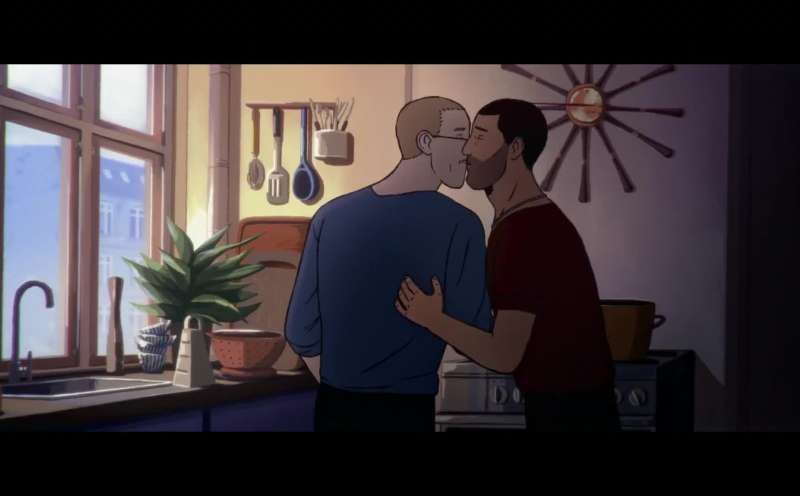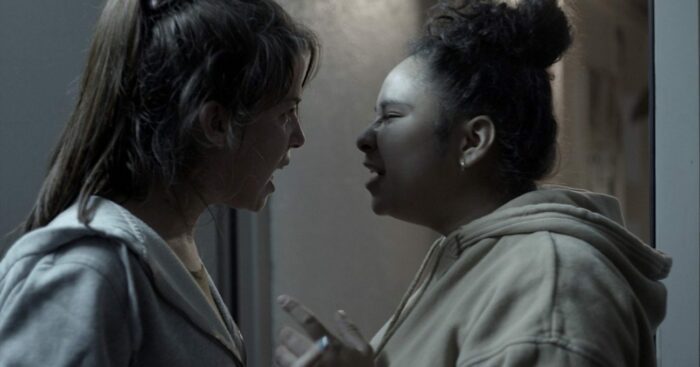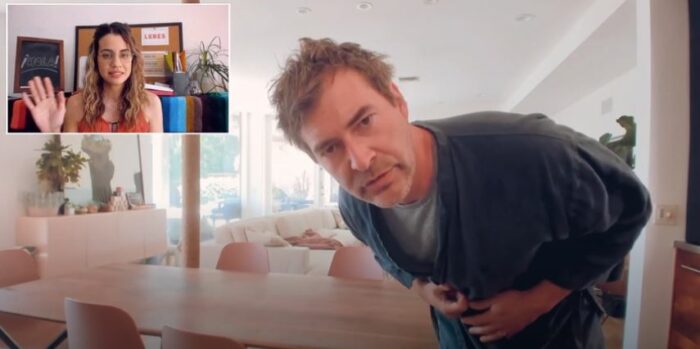This article is part of a series, previous entries in which are available on the site.
Flee

Today’s three films have little in common, except that they might be the three best films of the festival so far. Those of you who have been keeping up with these articles and who also read my coverage of last year will have noticed that I’ve been a lot less enthusiastic with my praise this year. Nearly every film has had some major flaw that I’ve been forced to take issue with, and none have been as exceptionally moving as some of last year’s early releases like Herself, Mowgul Mowgli and The Painter and the Thief. Fortunately, though, things seem to be picking up with a run of poignant, impactful and engaging movies that have real potential outside of the festival grounds.
One film already proving itself to have legs is Flee, Jonas Poher Rasmussen’s animated docu-drama which premiered to rave reviews at this year’s Sundance Film Festival and whose buzz has not abated since. With its context of middle eastern conflict in the 1980s, Danish setting, animated documentary style and heavy themes of memory and trauma, not to mention the two films’ equivalent quality, comparisons to Ari Folman‘s Waltz with Bashir are more or less unavoidable, but Flee distinguishes itself with its lighter and more empathetic touch. Where Waltz with Bashir looked at guilt, culpability and atrocity, this film, which is more or less guaranteed to accrue companion status, is more about loneliness, suffering and the enchantment of familial refuge.
The film is built upon the memoirs of Amir Nawabi, an Afghani man who arrived in Denmark in the late ’80s and made a new life for himself with his boyfriend Kasper, but he has been haunted by his experiences on the harrowing journey ever since. Flee is his testament, the moment he finally comes clean with himself and the world and tells his whole story, via Poher Rasmussen, his friend and interlocutor. The process is not easy on Amir; he has been living with a mixture of trauma and lies for decades and doesn’t quite feel ready to confront his life story. As the youngest child, he also finds himself burdened with a kind of survivor’s guilt for all his family sacrificed to provide him with the life he now has. Nonetheless, he continues to tell his story, with necessary but distressing candour.
His tale does not seem exceptional among refugees; many could tell similar stories in which hope and grief, joy and loss are so inextricably mingled. It’s a cold tale containing a lot of suffering, yet the few moments of life that bring salve to so much purgatory are still there, many of them revolving around Amir’s sexuality and the moments in his life that reinforce it. In one of the few wry moments of outright humour, the initial transition into a flashback is accompanied by a reversion to a more rough, sketched animation style and the opening bars of “Take On Me” by A-Ha, transitioning to the young, gay Amir, skipping through the streets of Kabul in his sister’s nightie, the immortal synth-pop classic blaring through his headphones. A climactic coming out scene resolves in the most heartwarming way possible, a jubilant moment of acceptance where one expects only misunderstanding and rejection.
Sadly though, these are not the dominant images of Flee, which is not a film that gives into nostalgia nor shies away from the realities of Amir’s life story. The anecdotes of suffering and privation he experienced while seeking asylum in the west are upsetting and we’ve long moved past the point where we are allowed to be shocked by such testimonials—it’s just one more in a long line of signposts telling developed nations to reform their immigration policies and bring the deaths and detainment to an end.
The animation may run at a low frame rate and look rather rough, but it’s naturalistic enough to feel genuine and it’s an inspired way to ameliorate the transitions between Amir’s modern-day testimonials and the dramatic re-creations, coalescing them into a single whole that is his truth. That’s ultimately his liberation; unleashing his truth is the release that unburdens him from the lies he’s been forced to maintain and that have kept him from the intimate and honest personal connections that are the very essence of a lived life.
La Mif

A very different approach to a non-linear narrative is found in La Mif (a.k.a. La Fam), a Swiss docu-fiction from director Fred Baillif following the inhabitants of a home for displaced children: adolescent women of the state, orphans or children taken into care and raised by the care system. The film is broken up into as many as ten chapters, each one with its own independent linear chronology, and each one principally following a different girl at the home, or an adult carer trying to keep the institution running in the face of contemptuous board members, pushy parents and the troubled kids themselves. The director Lora (Claudia Grob) runs the home on understanding and indulgence, an outlook the film reflects, but is fighting an uphill battle to keep it that way, including with her own personal demons.
The first story is that of Audrey, a sexually active seventeen-year-old who causes a miniature scandal when she is discovered having sex with a fourteen-year-old boy, an incident which is the catalyst for the home going all-girl henceforth. The story unfolds episodically, with each character given the time to establish their own situation and personality before the film moves onto another, bringing their collective stories to whatever resolution possible without straining credulity. Each character is drawn with authenticity, complexity and compassion, seldom resorting to vague caricature or stereotype and immaculately played by the talented young cast, bringing each role to vivid and naturalistic life. As frustrating as their immaturity inevitably is, their rebellious, self-destructive charm and genuine affection for one another can’t help but grow on you.
https://youtu.be/bY4eWnVj0g0
With such a scrambled, non-linear narrative structure though, one can’t help but wonder if a more orthodox telling might have been more efficacious, given the detailed intimacy of the film’s scope and the huge cast of three-dimensional characters the otherwise brilliant script is working with. Presenting the stories like a Rubik’s Cube has merit as a technique, allowing us to see the character’s behaviour in isolation, and again later, in context. This is especially true when the film introduces doubt into some of their stories, but it’s a shallow trick that wears thin compared to the honesty of the character’s actual stories themselves. Perhaps the fragmentary structure serves to insulate the film against the more melodramatic turns it ends up taking, but it also diffuses the emotional intensity of those same dramatic moments.
Despite the doubts I have about the ambitious structure, La Mif is a thoughtful, empathetic and ultimately very positive and healing take on harsh issues like infant mortality and incestual sexual abuse, and tough debates: how close is too close? How young is too young? How free is too free? It has the realism and the critical gaze of a film like The Class and something approaching the warmth and empathy of a film like My Life as a Courgette or the fantastic Short Term 12. It’s an incisive, dense and rewarding piece that oughtn’t to be missed lightly.
Language Lessons

Anyone who bought stock in Zoom, Teams or Skype at the end of 2019 must be feeling very good about their life choices right now. Since the gimmick was first experimented with by films like Unfriended and Searching in the pandemic era, films and TV shows filmed entirely over video calls has become its own subgenre and discipline, around which has developed a unique visual language to accommodate the limitations of the medium. Those limitations are pretty self-evident and anyone who has tried to watch a prime time topical talk show try and adapt itself to home filming will know how incredibly awkward it can be.
Plaudits then to Natalie Morales and Mark Duplass for their platonic online rom-com Language Lessons, which manages to unobtrusively dramatise an epistolary relationship in a way that doesn’t feel overly mannered or inextricably locked to the zeitgeist. On the contrary, Language Lessons is a fresh, funny and sincerely touching dramedy carried by more than the naturalistic performances and clever, improv-y dialogue.
The film follows Adam and Carino, played by Duplass and Morales who co-wrote the script, with Morales directing solo. Adam is a wealthy inhabitant of Oakland California who is bought two years of online Spanish lessons by his husband Will, who springs his new tutor Carino on him one morning. The film then takes a turn so unexpected that I kept waiting for the other shoe to fall. Perhaps it’s due to the weaknesses in Duplass’s performance that I didn’t by this narrative turn at first, supposing it instead to be a dark joke on the part of an acknowledged prankster. Some of the darker humour in this part falls very flat and awkwardly and though not awful, it’s by far the weakest section of the film.
However, this is just the first of many unexpected and subversive turns the narrative takes, flirting with cliches but always with the intention of subverting them and thereby exposing the central conundrum of the film: growing to care about someone faster than you get to know them. It’s a recognisable and very uncomfortable feeling, to want to help and support someone but not knowing them well enough to be equipped for the task or even know what is ailing them. As Adam and Carino exchange their video epistles, the audience makes some easy assumptions about them both, as they do in turn about each other, and the film cannily subverts those expectations with its stereotype-busting revelations.
Despite the constraints of the filmmaking gimmick, Language Lessons manages to tell its tale of friendship with unexpected fluency, humour, humility, tact and grace, telling the story of two warm, caring and emotionally damaged people looking out for one another, dealing with their issues through humour, and building to a fantastically cheesy finale that cannot but bring a smile to the hardest of hearts.



